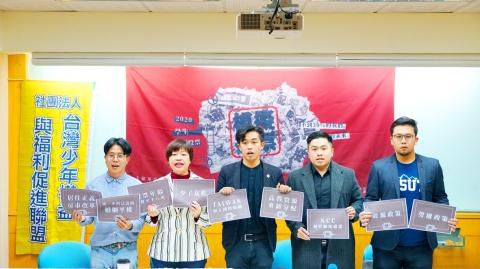The National Students’ Union of Taiwan (NSUT) yesterday launched an online mock election for students ahead of the Jan. 11 presidential and legislative elections.
The mock election was co-organized by groups including the Taiwan Youth Association for Democracy and the Taiwan Alliance for Advancement of Youth Rights and Welfare, as well as 35 university student unions, said the union, which was founded in April.
Online voting was scheduled to open to holders of student identification cards from senior-high schools, vocational high schools and universities at 8:20pm last night, it said.

Photo courtesy of the National Students’ Union of Taiwan
Students would be able to vote for a presidential candidate and a political party through a messenger chatbot linked to the union’s and the alliance’s Facebook pages, it added.
Online voting is to close at 8:20pm on Sunday, and the results are to be announced at 10am on Monday, it said.
Earlier this month, organizers sent out multiple-choice questionnaires to all presidential and legislative candidates, as well as political parties, union president Tan Ko-him (陳佑維) said.
The survey asked their stance on 10 topics, including a proposal to lower the minimum voting age to 18, marriage equality and labor policy, he said, adding that responses would be posted online.
Students without voting rights or who cannot return to the places where they are registered to vote make up less than 30 percent of Taiwan’s voting age population, Tan said.
However, they are to bear “100 percent of the future fate of Taiwan,” he added.
Historically, the turnout among young voters has always been relatively low, association secretary-general Alvin Chang (張育萌) said.
Statistics show that the voter turnout among 20-to-35-year-olds in the elections held between 2008 and 2016 was about 50 to 60 percent, while turnout among voters aged 65 and older is about 80 to 90 percent, he said.
Chang cited a higher overlap between the legal and actual residences of middle-aged and older voters as a reason for their higher turnout.
Taiwan’s electoral system is “unfair to young people,” he said, adding that many young voters are unable to travel back to their hometowns during elections because of financial constraints.
About 1.18 million people would be able to vote for the first time next month, he said, citing Central Election Commission data.
“Can 1.18 million voters sway the results of an election? I believe we all have an answer in our hearts,” he added.

US climber Alex Honnold is to attempt to scale Taipei 101 without a rope and harness in a live Netflix special on Jan. 24, the streaming platform announced on Wednesday. Accounting for the time difference, the two-hour broadcast of Honnold’s climb, called Skyscraper Live, is to air on Jan. 23 in the US, Netflix said in a statement. Honnold, 40, was the first person ever to free solo climb the 900m El Capitan rock formation in Yosemite National Park — a feat that was recorded and later made into the 2018 documentary film Free Solo. Netflix previewed Skyscraper Live in October, after videos

Starting on Jan. 1, YouBike riders must have insurance to use the service, and a six-month trial of NT$5 coupons under certain conditions would be implemented to balance bike shortages, a joint statement from transportation departments across Taipei, New Taipei City and Taoyuan announced yesterday. The rental bike system operator said that coupons would be offered to riders to rent bikes from full stations, for riders who take out an electric-assisted bike from a full station, and for riders who return a bike to an empty station. All riders with YouBike accounts are automatically eligible for the program, and each membership account

A classified Pentagon-produced, multiyear assessment — the Overmatch brief — highlighted unreported Chinese capabilities to destroy US military assets and identified US supply chain choke points, painting a disturbing picture of waning US military might, a New York Times editorial published on Monday said. US Secretary of Defense Pete Hegseth’s comments in November last year that “we lose every time” in Pentagon-conducted war games pitting the US against China further highlighted the uncertainty about the US’ capability to intervene in the event of a Chinese invasion of Taiwan. “It shows the Pentagon’s overreliance on expensive, vulnerable weapons as adversaries field cheap, technologically

NUMBERs IMBALANCE: More than 4 million Taiwanese have visited China this year, while only about half a million Chinese have visited here Beijing has yet to respond to Taiwan’s requests for negotiation over matters related to the recovery of cross-strait tourism, the Tourism Administration said yesterday. Taiwan’s tourism authority issued the statement after Chinese-language daily the China Times reported yesterday that the government’s policy of banning group tours to China does not stop Taiwanese from visiting the country. As of October, more than 4.2 million had traveled to China this year, exceeding last year. Beijing estimated the number of Taiwanese tourists in China could reach 4.5 million this year. By contrast, only 500,000 Chinese tourists are expected in Taiwan, the report said. The report